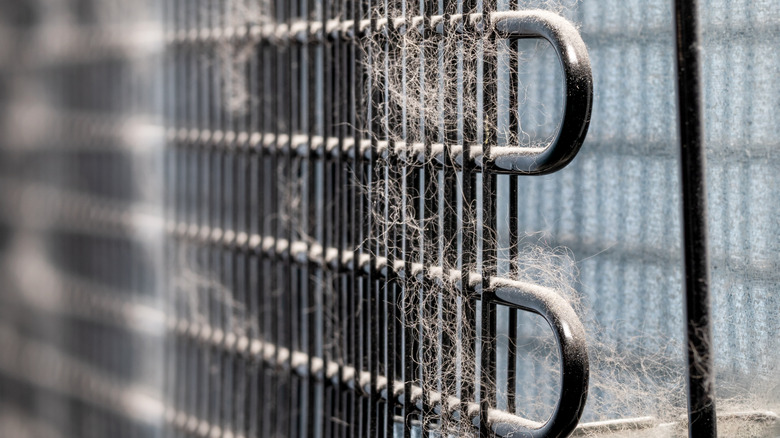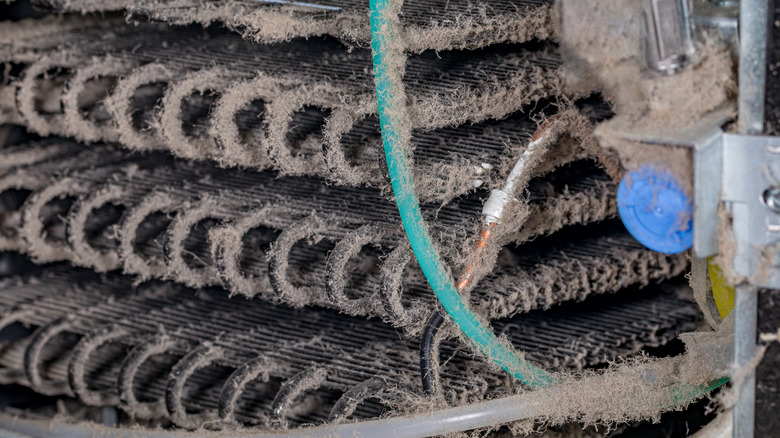How Often Should You Really Be Cleaning Your Refrigerator Coils? It Depends
We may receive a commission on purchases made from links.
In the modern age, refrigerators are an absolutely essential appliance in the kitchen. Their job is simple and often overlooked, but keeping food cold helps to prevent the formation of bacteria, helping to ensure that our food stays fresh longer and is less likely to get us sick. As a result, if your refrigerator isn't cooling efficiently, you could face consequences that range from food poisoning to excessive wear and tear that causes your refrigerator to give out more quickly.
If you've found yourself asking why your refrigerator isn't cooling, one major component is likely to blame: the coils. Condenser coils — the ones found along the back or bottom of your fridge — are designed to release heat from your refrigerator, allowing it to cool. They're filled with coolant that picks up heat from inside the refrigerator and releases it on the outside, ensuring that the air inside your icebox stays as chilly as you want it to be. If these coils can't make adequate contact with the outside air because of an accumulation of dust and grime, however, they can't release the heat as effectively, meaning that you could be stuck with a refrigerator that's running at a higher temperature than you want. Therefore, the general rule of thumb is to clean your refrigerator coils around once every six months, but special circumstances can increase this frequency.
Factors to consider when deciding how often to clean your refrigerator coils
When it comes down to it, the most important factor in determining how frequently you should clean your refrigerator coils is how quickly you think they'll get dirty based on your specific environment. If you live somewhere where you frequently have to face off against dust in the air or dirt accumulating on your surfaces, it's safe to assume that the same thing is happening on your coils. Another major consideration, especially if your coils are under your refrigerator, is pet hair. If you have pets around the house that are prone to shedding, it can be a good idea to amp up your cleaning routine during the times of the year when they drop more hair, like spring and summer.
Additionally, older models can often benefit from more frequent cleaning as they're already likely beginning to lose efficiency, but, as always, your fridge manufacturer's instructions should be the first source you consult when determining how often to clean the coils. If you've never cleaned them before, or you've simply fallen out of your routine, take a peek to see if the coils look visibly dirty. Who knows — a simple dust-off could save you a call to a handyman.
How to clean your refrigerator coils
If, after checking your refrigerator's coils, you decide it's time for a clean, here's what you need to know. You'll be able to choose one of two options: one, regular maintenance, only requiring a vacuum with a brush attachment, or two, a deep clean that also requires a microfiber towel and a refrigerator coil brush like this Vanitek 26-inch brush from Amazon. Whichever method you choose, it's also beneficial to grab a flashlight if you're going to be working in a tight, hard-to-see space.
To begin, you're going to want to unplug your refrigerator to ensure you stay safe throughout the cleaning process. After locating the refrigerator's coils either along the back or underneath the unit, remove the protective grid, if there is one. If you think you can effectively clean the coils with just your vacuum, get to work gently clearing away any dust and debris until you're satisfied.
If you'd like to do a deeper clean, insert a refrigerator coil brush between the coils using a back-and-forth motion until each part looks clear. Vacuum up any leftover debris and wipe down the coils using a microfiber cloth before putting the protective grill back in position. Once all is said and done, plug your refrigerator back in and pat yourself on the back — you should notice that it begins to run more efficiently, especially if it's been a long time between deep cleans.


